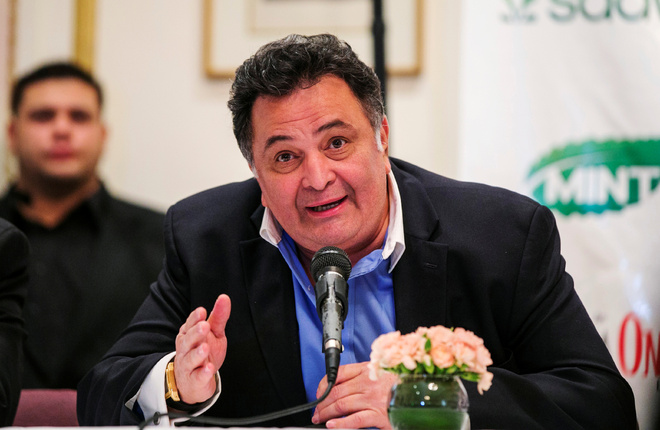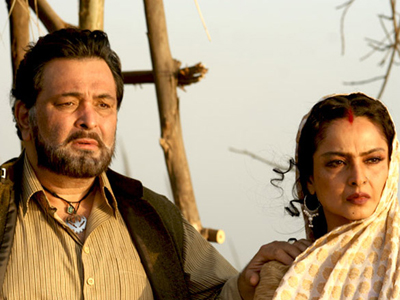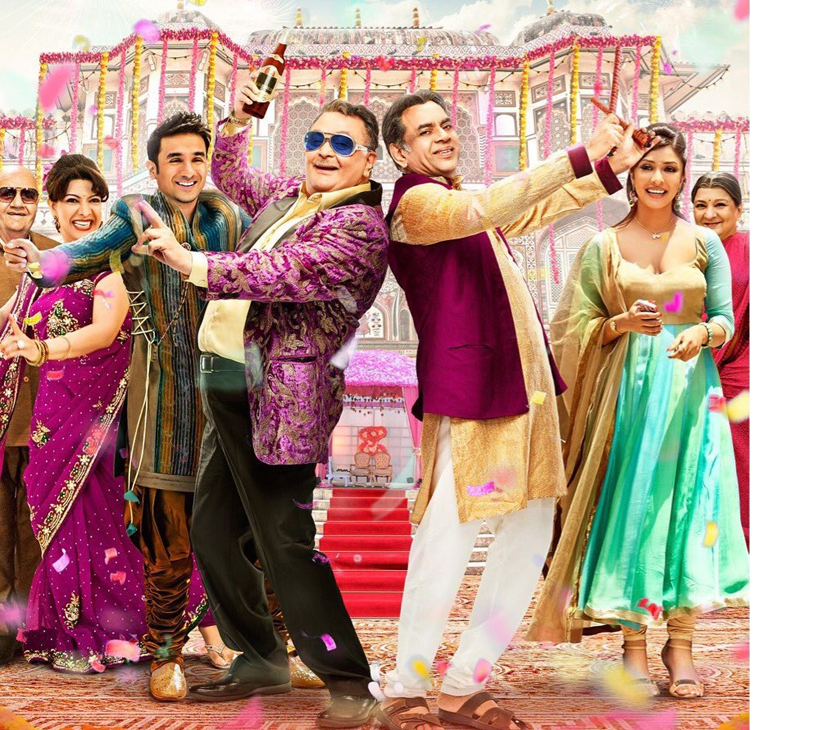
Saibal Chatterjee
Hindi cinema of the 1970s and 1980s, the two decades that saw Rishi Kapoor at his peak, rarely, if ever, sought geographical or cultural specificity in the stories that it told. The Mumbai movie industry catered to a pan-Indian audience. In the films that it produced, therefore, it refrained from placing its characters in a defined ethos. On the stray occasions that it did, the manner of doing so was strictly superficial.

Kapoor, a Punjabi by birth, was a youth icon whose appeal transcended linguistic boundaries. Several of the major directors that the hugely popular actor worked with had roots in Punjab but they did not always set their films in the state. His illustrious father, Raj Kapoor, who launched his career as a lead actor in 1973 by casting him in the super-successful Bobby, was born in Peshawar, North West Frontier Province.
Lyallpur in undivided Punjab was the birthplace of H.S. Rawail, with whom the actor did 1976’s Laila Majnu. And Yash Chopra, who cast Kapoor in the multi-starrer Kabhie Kabhie in 1976 and went on to do other films with him, including Chandni (1989), was born in Lahore. But with Rishi Kapoor, they did not ever make a trip back to their roots.

Making of a star
It wasn’t until the mid-1980s that Kapoor played a role in a film that was located wholly in Punjab — Sukhwant Dhadda’s Ek Chadar Maili Si. Adapted from Rajinder Singh Bedi’s Sahitya Akademi Award-winning Urdu novel of the same name, the social drama wasn’t a box-office success. But all these years later, the film stands out as a shining example of a piece of formidable literature that was effectively brought to life on the big screen with the aid of great performances from the actors and outstanding cinematography.
Ek Chadar Maili Si, which had outstanding performances from Hema Malini and Rishi Kapoor as a mother of four and her younger brother-in-law in rural Punjab whose relationship undergoes a transformation when the former’s alcoholic husband (played by Kulbhushan Kharbanda) is killed in a case of mistaken identity by the brother of a sexually assaulted girl.

The film deserves to be rediscovered by audiences. It ranks among the four best screen adaptations of works by Punjabi writers, alongside Chandraprakash Dwivedi’s Pinjar (based on Amrita Pritam’s celebrated novel), Mani Kaul’s Uski Roti (a 1969 film adapted from a Mohan Rakesh short story) and Rajendra Bhatia’s Pavitra Paapi (1970), based on Nanak Singh’s novel of the same name. The last-named film came into existence at the insistence of Rawalpindi-born Balraj Sahni, a great admirer of the writer’s literary output.
In the context of Rishi Kapoor’s career, Ek Chadar Maili Si, set in pre-Independence Punjab, is a marked departure. It was the only literary adaptation that the actor was ever a part of. The film allowed him to traverse the entire gamut from a happy-go-lucky youngster in love with a bubbly nomadic girl (Poonam Dhillon) to an emotionally conflicted man who, under the pressure of social custom, is required to marry his sister-in-law, who is more than 10 years older than him.

Ek Chadar Maili Si was a sharp critique of the practice of chaadar daalna, which was prevalent in parts of Punjab. Kapoor’s interpretation of the character of Mangal contained the seeds of his evolution in the new millennium as an able character actor who played a wide range of roles with panache in films such as Do Dooni Char, Kapoor & Sons, Mulk and Agneepath.
In Habib Faisal’s Do Dooni Chaar (2010), Kapoor is a Punjabi middle-class mathematics teacher Santosh Duggal, who lives with his family in a cramped apartment in Delhi’s Lajpat Nagar. The teacher depends on a rickety scooter to get him around town but he nurtures the hope of buying a car someday. Do Dooni Chaar was a slice-of-life drama enlivened by Kapoor’s chemistry with his real-life wife Neetu Singh, with whom he was reuniting on the screen after a long hiatus. The film revealed the actor’s ability to play down his starry qualities and flesh out a completely believable middle-aged Delhiite.
The patriarch arrives

Around the same period, Kapoor had two films that had him in the role of a Punjabi patriarch — Sadiyaan (2010) and Patiala House (2011). In the former, helmed by Raj Kanwar, who directed Shahrukh Khan’s debut film (Deewana, 1992) and also launched the career of Priyanka Chopra (Andaaz, 2003), Kapoor is Rajveer, the head of a Lahore-based family who, in 1947, flees across the newly drawn border with his wife Amrit (Rekha). In the house they move into, Amrit finds a boy abandoned by a Muslim family that has left everything behind to escape the Partition riots. Rajveer and Amrit raise the foundling as their own son. He grows up as a Sikh boy Ishaan. On a trip to Kashmir, he falls in love with a Muslim girl. The latter’s family rejects his proposal for marriage. When Rajveer and Amrit get wind of the development, they decide to reveal that Ishaan is actually a Muslim boy.
Sadiyaan was a box-office failure, but Nikhil Advani’s Patiala House, loosely inspired by the life and career of English left-arm spinner Monty Panesar, who was addressed by his fans as the Sikh of Tweak. The film had Kapoor in the role of an ageing turbaned Sikh Londoner who cannot reconcile himself with the idea of his son (Akshay Kumar) playing for England. His father eventually relents: it takes an imitation of Lala Amarnath’s unusual bowling style — a short run-up and delivery off the wrong foot — to bring the old man around. The climax was a doff of the hat to Lala Amarnath’s iconic status in Indian cricket history. Kapoor had played another London-based turbaned Sikh with customary aplomb in Imtiaz Ali’s Love Aaj Kal. His character, hotelier Veer Singh Panesar, gives life-altering tips to the protagonist, played by Saif Ali Khan, on matters of the heart. Veer narrates his own love story set in the 1960s, with Saif also playing the old man’s younger avatar.
A different act
The last phase of Kapoor’s acting career, during which he played his age, allowed him to explore human foibles and frailties with greater leeway than his stint as a romantic hero afforded him. It wasn’t surprising that directors opted to use the emotional warmth that his screen persona exuded by casting him as an avuncular Punjabi gentleman who could be cantankerous when things did not go his way.
Be it the temperamental Bhajanlal Bhalla in Umesh Shukla’s All is Well (2015), the impish 90-year-old Amarjeet Kapoor in Kapoor & Sons (2016), the larger-than-life Guggi Tandon in the romantic comedy Patel Ki Punjabi Shaadi (2017) or the standoffish long-time Old Delhi resident Raj Mathur in Leena Yadav’s Rajma Chawal, Kapoor gave his all to every role he played, revealing his amazing versatility and adaptability.
Punjabi cinematographer-filmmaker Manmohan Singh (whose credits as director of photography include the epochal 1981 Punjabi film Chann Pardesi, besides Lekin…, Maachis, Chandni, Betaab and Dil to Pagal Hai) cast Kapoor opposite Tabu in the romantic drama Pehla Pehla Pyar (1994) but the ethos of the film was indeterminate.

One of Kapoor’s last films, Jhootha Kahin Ka, was directed by Punjab’s very own Smeep Kang. It was, however, a Hindi-language comedy-drama that did not have much do in a direct sense with Punjab. But Kapoor, as always, stood out in an ensemble cast.
Join Whatsapp Channel of The Tribune for latest updates.



























